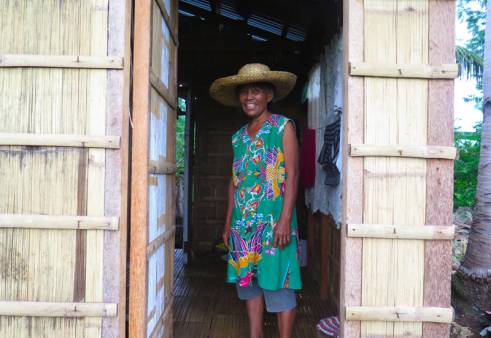By Sarah Gillam
On the one year anniversary of Typhoon Haiyan, we release a joint report with our partner in the Philippines, Coalition of Services of the Elderly, showing that older people have been key to helping 150,000 people recover from the typhoon.
New skills have been acquired, stronger homes built and farming diversified using global aid, to help communities on the road to recovery.
Based on the records provided by the Philippine Statistics Authority, approximately 1.27 million people over the age of 60 were affected by the typhoon, or 8% of the reported 16 million people affected, many losing their homes, livelihoods and loved ones.
Ensuring older people are part of the recovery process
Before Typhoon Haiyan, nearly 65% of older people were working but many were not included in cash-for-work programmes after the disaster.
Poverty levels and malnutrition rates in Leyte province were high. And poor access to information compromised people’s ability to receive help. For example, 75% of older people interviewed by HelpAge and UNHCR did not know that medical services were available free of charge.
As a result, with our partner the Coalition of Services of the Elderly (COSE), we stepped in to ensure older people were a key part of recovery efforts.
Our main objectives were to ensure older people had regular incomes, shelter, healthcare and access to their rights and entitlements.
Rebuilding homes and livelihoods
Working with local older people organisations, we set about making this happen, through cash transfers, shelter repair and training in carpentry and geriatric care, piloting a mobile community health service and ensuring community pharmacies had access to appropriate and affordable medicines.
We also helped older people access legal documents and senior citizen ID cards, through training on their entitlements.
Targeted training in crop diversification was provided to farmers after coconut trees were wiped out. This helped farmers to raise household income with increased harvests of more resilient crops.
Older carpenters were trained in new building techniques, resulting in stronger shelters with improved resistance, for older people in the community. Those that had lost their tools were provided with replacements, to ensure they could resume work.
“HelpAge and COSE created ways for us to help our fellow senior citizens.” said Virgilio Virola, 60, from Palo, Leyte. “It really helped to take part in the carpentry training.”
Creating age-friendly communities
At least 10,000 older people received cash transfers, with 11,000 older people receiving cash and repair kits to build new homes. Rice seeds and fertiliser were given to 7,000 farmers. Cash helped kick start businesses ranging from selling fish and food to taxi services, pig and poultry farming and fishing.
This support has enabled older people to help one another and improve their own resilience in the aftermath of the typhoon, encouraging them to actively participate in the process of rebuilding age-friendly communities.
“We received 10,000 pesos (US$222) from HelpAge-COSE and restarted our mini store and food outlet. Now we make sure we have some savings from these businesses,” said Erlinda Yabao, 71, from Tacloban, Leyte.
We have also encouraged older people to join training in psychosocial support and present radio programmes about some of the issues being discussed.
Realising older people’s potential to contribute
Many older people said that joining in HelpAge activities made them realise how they could contribute, helping them to feel part of society again.
“In any emergency, helping communities to meet their most immediate needs as well as aiding longer term recovery is a challenge,” said Ian Clarke, HelpAge International & Coalition of Services for the Elderly Emergency Programme Director in the Philippines.
“But we have overcome these challenges with the active involvement of older people themselves as well as with the support of their organisations,” he said.
The Confederation of Older Person’s Association in the Philippines (COPAP) also contributed to the success of the emergency relief by providing psychosocial support to older people, identifying specific needs and helping to distribute aid.
